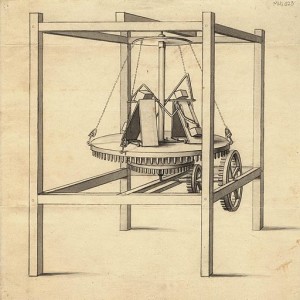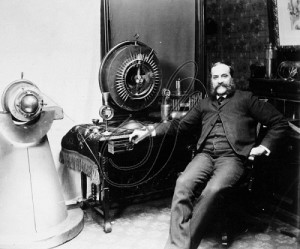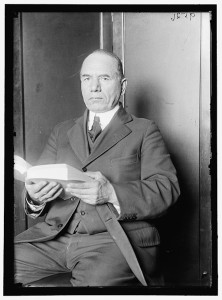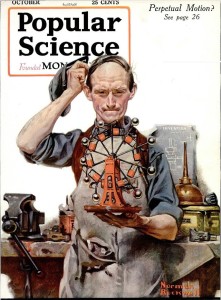Podcast: Play in new window | Download
Subscribe: Apple Podcasts | RSS
What if we could build a machine that ran forever without using up any fuel? Such a machine would be a perpetual motion machine, and, sadly, it is impossible. Even so, people have been trying to build them for as long as people have been building machines. Perpetual motion machines appear in many early books about machines, and hundreds have been patented. In this episode I look at how and why these impossible devices have interested so many people for so long. The answer is related to how people see inventors and to a tension between thermodynamics and the technological imagination. In the end, perpetual motion machines also give us a way to think about today’s ecological concerns.
- A diagram of an over-balance wheel. The weights swing out from the center, making the wheel heavier on one side than the other. Image created by Dims, via Wikipedia Commons
- A over-balance-type perpetual motion machine that appeared in Villard de Honnecourt’s sketch book in 1230. Via Wikipedia Commons
- In this water wheel design, the water is held in a tank at the top. It turns the wheel, which pumps the water back up to the tank. From Georg Andreas Böckler, Theatrum Machinarum Novum, 1661 via Wikipedia Commons
- Thousands of people bought tickets in Philadelphia and New York to see this mechanical wonder. Nathan Sellers discovered the fraud in Philadelphia, and Robert Fulton uncovered it in New York. via Wikimedia Commons
- Keely poses with one of his “etheric engines.” Keely was one of the most successful perpetual motion frauds of the 19th century. His Keely Motor Company was capitalized at 5 million dollars, which would be about 100 million today. Via Wikimedia Commons
- Garabed T. K. Giragossian invented a perpetual motion machine that captured the nation’s attention. Congress passed a special act to protect it and President Woodrow Wilson assigned a team of scientists to investigate. By Harris-Ewing collection [Public domain], via Wikimedia Commons
- The Norman Rockwell painting on the cover of this issue of Popular Science shows a classic over-balance-type wheel. From Popular Science Magazine, Vol.97, No.4 (October 1920) via Wikimedia Commons
- This clock was wound by changes in atmospheric pressure. You could see it as a perpetual motion machine that actually worked. Engraving by J. Lodge, 1774. Via Wikimedia Commons
Notes and References:
For an overview of perpetual motion machines, see Arthur W. J. G. Ord-Hume, Perpetual Motion: The History of an Obsession (St. Martin’s Press, 1977). For a collection of primary sources, see Henry Dircks, Perpetuum Mobile, Or, Search for Self-Motive Power, during the 17th, 18th, and 19th Centuries (London, 1861). For a reflection on the importance of perpetual motion in the early 18th century, see Simon Schaffer, “The Show That Never Ends: Perpetual Motion in the Early Eighteenth Century,” The British Journal for the History of Science 28, no. 2 (June 1, 1995): 157–189.
For more on the history of thermodynamics, see Crosbie Smith, The Science of Energy: A Cultural History of Energy Physics in Victorian Britain (University of Chicago Press, 1999), or
Crosbie W. Smith, “William Thomson and the Creation of Thermodynamics: 1840-1855,” Archive for History of Exact Sciences 16, no. 3 (January 10, 1977): 231–288. For more about the relationship between religious and scientific ideas about a finite world, see Helge s. Kragh, “Cosmology and the Entropic Creation Argument,” Historical Studies in the Physical and Biological Sciences 37, no. 2 (March 2007): 369–382.
The term “restless technology” (from which the title of this podcast comes) is from Hans Jonas, “Toward a Philosophy of Technology,” in Hastings Center Report 9/1 (1979): 34-3, and reprinted in Robert C Scharff and Val Dusek, ed., Philosophy of Technology: The Technological Condition : An Anthology (Malden, MA: Blackwell Publishers, 2003).
Music for this episode is: Jiony, “Not Found (Invisible)” on Old Song EP, and Jiony, “A Veces” on Waiting for the Sun.
[DISPLAY_ULTIMATE_SOCIAL_ICONS]








